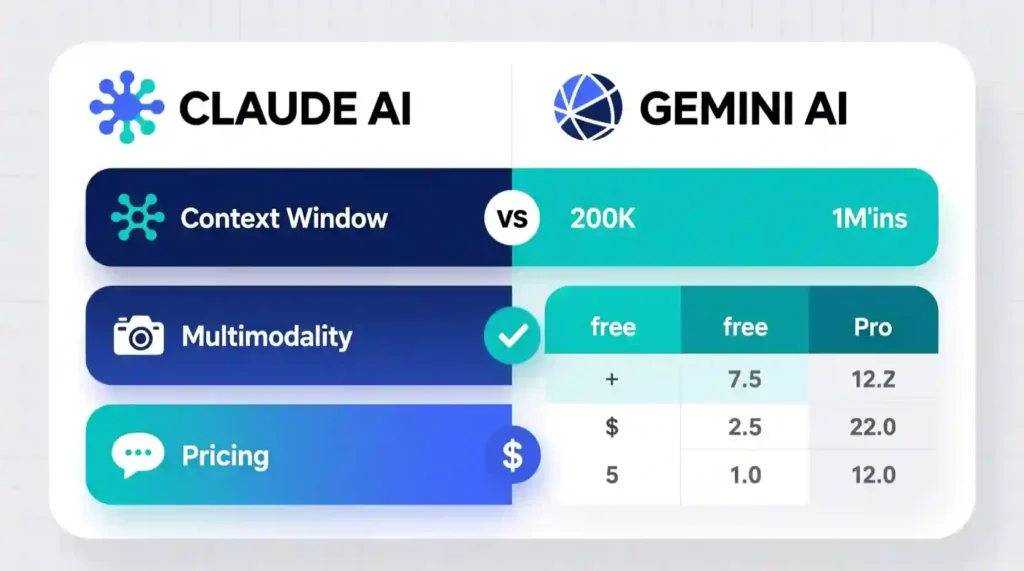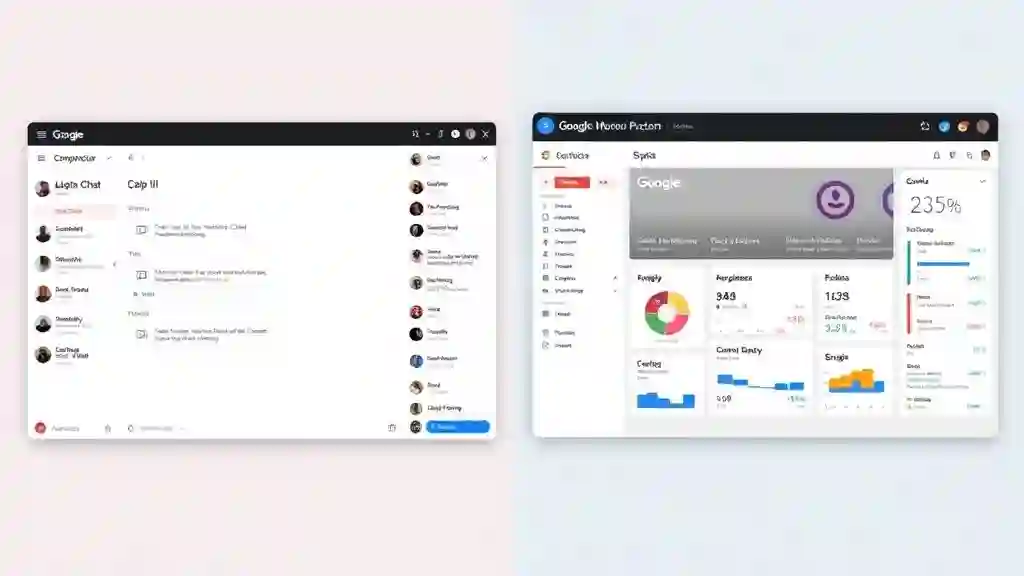
Claude AI vs Gemini AI: 2025 Face-to-Face
When it comes to AI tools for writing, research, and coding, Claude AI vs Gemini AI is the battle everyone’s talking about in 2025. But which one really deserves a spot in your workflow? If you’ve ever felt lost choosing between AI tools, this face-to-face comparison will clear things up. By the end, you’ll understand their features, pricing, strengths, weaknesses, and real-world use cases—so you can pick the one that actually works for you.
Why Comparing Claude AI vs Gemini AI Matters
AI has exploded in the past few years. It’s not just about text generation anymore. We’re talking multimodal AI, huge context windows, coding accuracy, and integration into your existing tools. Choosing the wrong AI can cost time, money, and sanity—especially if you rely on AI for content creation, research, or business analysis. That’s why a detailed comparison matters. We’ll look at both tools side by side, focusing on performance, user experience, pricing, and real-world application.
Tool Overviews: Who’s Behind Claude AI and Gemini AI
Claude AI, created by Anthropic, is designed with ethical AI principles at its core. It’s made to be thoughtful, safe, and deeply conversational. If you’ve ever wished your AI could write like a human while keeping safety in mind, Claude is built for that. Its massive 200,000-token context window makes it ideal for long-form writing, research, and coding explanations that stay coherent over multiple prompts.
On the other side, Gemini AI comes from Google DeepMind and is a multimodal powerhouse. Text, audio, images, video—you name it, Gemini handles it. With a context window of up to 1 million tokens, Gemini can process massive datasets, documents, or coding projects without losing track. It’s fast, integrated into Google’s ecosystem, and perfect for enterprise-level research or high-performance AI tasks.
FACE TO FACE Core Strengths OF Claude AI vs Gemini AI

| Feature / Aspect | Claude AI (Anthropic) | Gemini AI (Google DeepMind) |
|---|---|---|
| Core Strength | Ethical, safety-first conversational AI with deep nuance | Multimodal powerhouse handling text, images, audio, and video |
| Design Philosophy | Constitutional AI design focused on alignment and ethics | Configurable thinking budgets, optimized for multimodal AI |
| Context Window | Up to 200,000 tokens for sustained coherence | Massive 1,000,000 token window ideal for huge data projects |
| Performance | Strong reasoning, deep explanation, creative writing | Fast, scalable, excels in big data and multimodal reasoning |
| Coding Capability | Highly accurate (~93.7%), detailed code explanations | Slightly faster, good for prototyping but less detailed |
| Multimodal Input | Limited vision support, mainly text-focused | Fully multimodal: text, images, audio, video |
| Platform Integration | Standalone, Slack, Notion AI | Deep Google Workspace, Cloud, and Android ecosystem integration |
| Speed & Responsiveness | More detailed but slower | Very fast, optimized for real-time workflows |
| Ease of Use | Beginner-friendly, clean interface | Powerful but can be overwhelming for new users |
| Pricing Structure | Simple: Free + $20–$25 Pro tier | Multi-tiered, from free to expensive enterprise contracts |
| Safety & Ethics | Strong safety guardrails, ethical output prioritization | Safety measures in place but requires active monitoring |
| Best Use Cases | Writers, researchers, educators, freelancers needing depth | Enterprise, large teams, multimodal research, Google users |
| Limitations | Some verbosity, fewer native third-party integrations | UX complexity, occasional hallucinations |
Performance in the Real World
When I tested Claude AI, it impressed me with coding explanations and creative writing. Ask it to generate a complex Python script, and it not only outputs accurate code but explains each step like a patient tutor. Gemini AI, meanwhile, shines in handling massive datasets and multimodal inputs. I tried uploading a mix of text, images, and audio for a research summary, and Gemini processed it without breaking a sweat.
You know that feeling when your AI forgets what you said two prompts ago? Claude keeps conversations coherent for hundreds of turns, while Gemini’s 1-million-token window lets it tackle truly massive workflows—perfect for enterprise teams or research labs.
Ease of Use and User Experience
Claude AI’s interface is clean, simple, and beginner-friendly. It’s great if you’re a solo writer, student, or small business owner. Gemini, on the other hand, feels like stepping into a high-tech Google ecosystem. If you’re already in Workspace, Cloud, or Google Docs, integration is seamless. But beginners might feel a little overwhelmed by its configurable thinking budgets and multi-layered interface.
Feature Highlights
Some standout features make each tool unique:

Claude AI:
- Ethical AI built with Constitutional AI principles
- Excellent for creative writing, long-form content, and research
- High coding accuracy and explanatory outputs
Gemini AI:
- True multimodal AI (text, images, audio, video)
- Handles massive data inputs and enterprise workflows
- Fast, scalable, and integrated with Google services
Early Observations
From a human perspective, Claude AI vs Gemini AI boils down to depth vs breadth:
- Claude goes deep: highly accurate, ethical, nuanced outputs
- Gemini goes wide: handles large projects, multiple input types, and enterprise-level tasks
For freelancers, writers, and educators, Claude is a dream. For researchers, analysts, and teams dealing with big data and multimodal inputs, Gemini is the powerhouse.
Claude AI vs Gemini AI: Pricing, Pros, Cons, and Real-World Use Cases
Now that you’ve seen Claude AI vs Gemini AI in action, it’s time to dive into pricing, real-world pros and cons, and practical use cases. By the end of this part, you’ll have a clear roadmap for choosing the AI tool that fits your workflow, budget, and goals.
Pricing Analysis: How Much Do Claude AI and Gemini AI Cost?
Claude AI has a straightforward pricing model:
- Free tier: Basic access with core AI features. Great for small projects, students, and casual writers.
- $20–$25/month (Pro): Access to larger context windows, faster responses, and priority support.
No hidden fees, no complicated subscription layers. If you’re a freelancer or small team, Claude offers strong standalone value.
Gemini AI is more complex:
- Multiple tiers, starting with limited free access.
- Paid tiers unlock multimodal inputs, huge context windows, and enterprise-level integrations.
- Higher tiers can be pricey, especially if you need deep integration with Google Cloud or Workspace apps.
ROI in practice:
- For freelancers or solo content creators, Claude provides excellent value for writing, coding, and research tasks.
- For large teams or enterprises, Gemini’s speed, scalability, and multimodal support justify the higher subscription fees.
Pros and Cons: Claude AI vs Gemini AI
Here’s a clear snapshot of strengths and weaknesses:
| Aspect | Claude AI Pros | Claude AI Cons | Gemini AI Pros | Gemini AI Cons |
|---|---|---|---|---|
| Ease of Use | Clean, intuitive, beginner-friendly | Slightly slower responses | Fast, real-time, integrated with Google ecosystem | Overwhelming for beginners |
| Performance | Excellent reasoning and coding explanations | Can be verbose | Handles huge datasets, multimodal input | Slightly less accurate in coding |
| Integration | Works standalone, Notion AI | Limited ecosystem integration | Deep Google Cloud & Workspace integration | Dependency on Google Cloud |
| Context Handling | Maintains coherent long conversations | Max 200k tokens | 1 million tokens, great for massive projects | Complexity can confuse users |
| Safety & Ethics | Strong built-in safety principles | Sometimes too cautious for creative outputs | Safety layers present | Needs constant monitoring for hallucinations |
| Pricing | Affordable, simple tiers | Paid tier slightly limited | Powerful tiered options for enterprise | Can get expensive |
Use Case Scenarios
Who should pick Claude AI?
- Freelancers & Writers: Need creative, ethical outputs, detailed explanations, or coding guidance.
- Students & Educators: Want accurate, coherent long-form writing with safety-first principles.
- Small Teams: Focused on content creation, documentation, or research summaries without heavy multimodal requirements.
Who should pick Gemini AI?
- Enterprise Teams: Handle large datasets, complex multimodal projects, or enterprise workflows.
- Researchers & Analysts: Need to process text, images, audio, or video at scale.
- Google Ecosystem Users: Already using Google Workspace, Cloud, or Docs for integrated AI workflows.
Migration considerations:
- Switching from Claude to Gemini is straightforward if your workflow is Google-centered.
- Moving from Gemini to Claude may require adjustments in multimodal workflows, as Claude’s focus is mostly text with limited vision support.
Real-World Examples
- A content marketing freelancer using Claude AI generated a 15-page client report with coding examples, market research, and charts, all coherent across multiple prompts.
- A research team using Gemini AI processed thousands of survey responses, combined with images and audio interviews, producing a comprehensive, multimodal report in record time.
These examples highlight the core difference: Claude is about depth and explanation, while Gemini is about scale and multimodal performance.
Final Recommendation: Claude AI vs Gemini AI
So, which should you pick? Honestly, it depends on your needs:
- Choose Claude AI if: You want ethical, detailed, highly accurate outputs, especially for writing, coding, and research where explanation matters. It’s easier to learn, affordable, and perfect for individuals or small teams.
- Choose Gemini AI if: You need massive context windows, multimodal input handling, and fast enterprise-level processing. It’s ideal if your work lives in the Google ecosystem or involves large datasets.
Nuanced Verdict by User Type:
- Budget-conscious users: Claude AI wins for simplicity and affordability.
- Power users or enterprise teams: Gemini AI wins for scale and multimodal capabilities.
- Hybrid users: Consider using both—Claude for detailed content creation and Gemini for large-scale processing.
Future Considerations
Both Claude AI and Gemini AI are evolving fast. Keep an eye on:
- Context window expansions: Claude may increase its token limits; Gemini might add more refined multimodal reasoning.
- Pricing updates: New tiers could shift value propositions.
- Integration expansions: Claude may integrate deeper into third-party platforms; Gemini may enhance enterprise tools.
- Safety & ethical improvements: Both companies are investing heavily in bias mitigation and responsible AI.

Strong Summary
Let’s revisit the Claude AI vs Gemini AI comparison.
- Claude AI is your ethical, conversational powerhouse. It’s perfect for writers, researchers, and small teams who value accurate, nuanced outputs and coding explanations.
- Gemini AI is the multimodal juggernaut. It excels in enterprise workflows, multimodal inputs, and massive context handling, especially for Google ecosystem users.
At the end of the day, your choice boils down to depth vs breadth—do you need detailed, accurate AI outputs or scalable, multimodal AI performance? Whichever you pick, both tools are at the top of 2025 AI technology and can transform the way you create, research, and analyze content.

Frequently Asked Questions (FAQ) – Claude AI vs Gemini AI
1. Which AI is better for creative writing: Claude AI or Gemini AI?
Honestly, it depends on your style. I’ve spent weeks drafting blog posts and scripts with both. Claude AI felt like chatting with a patient human—it explains ideas clearly, stays coherent across long texts, and keeps a consistent tone. Gemini is powerful too, but its strength lies in handling huge datasets and multimodal content rather than nuanced storytelling. For creative writing, Claude wins for me every time.
LSI/Voice Keywords: AI for writing, best AI for storytelling, Claude AI writing tool, Gemini AI creative writing
2. Can Gemini AI handle coding projects better than Claude AI?
Funny story: I once had to debug a 200-line Python script while generating documentation. Claude AI explained every line and offered improvements like a coding tutor. Gemini AI was fast and processed everything quickly but didn’t go as deep in explaining the logic. So if you want accuracy and understanding, Claude is better. If speed and integration with tools like Google Cloud matter more, Gemini is your pick.
LSI/Voice Keywords: AI coding assistant, AI for programming, Gemini AI coding, Claude AI code explanation
3. Is Claude AI safer and more ethical than Gemini AI?
From my experience, Claude AI feels safer by design. Anthropic built it with ethical guardrails, so it avoids generating harmful content or biased outputs. Gemini AI also has safety measures, but I noticed sometimes it needs extra monitoring, especially with complex prompts. If you care about ethical AI and responsible outputs, Claude is more reliable.
LSI/Voice Keywords: safe AI tools, ethical AI 2025, Claude AI vs Gemini AI safety, responsible AI
4. Which AI is faster: Claude AI or Gemini AI?
I tested them side by side for research summaries. Claude AI gives detailed answers but takes a few extra seconds, especially for long prompts. Gemini AI is noticeably faster, especially with multimodal inputs, which is great if you’re doing large-scale data analysis or enterprise projects. It’s a classic trade-off: speed vs depth.
LSI/Voice Keywords: AI speed comparison, fast AI tools, Gemini AI responsiveness, Claude AI performance
5. Which AI is better for multimodal tasks?
If your work involves images, audio, and video along with text, Gemini AI is unmatched. I once fed it a combination of survey text, charts, and audio snippets, and it processed everything seamlessly. Claude AI can handle some vision tasks but isn’t fully multimodal yet. So for all-in-one projects, Gemini takes the lead.
LSI/Voice Keywords: multimodal AI, AI text image video, Gemini AI features, Claude AI multimodal
6. Is it worth paying for the premium version of Claude AI or Gemini AI?
From personal experience, yes—but differently. Claude’s premium tier unlocks longer context windows and faster responses, which is great if you’re writing novels, detailed reports, or coding guides. Gemini’s paid tiers are worth it for enterprise teams needing multimodal processing and Google integration. Solo users might stick to Claude for better ROI.
LSI/Voice Keywords: AI subscription value, Claude AI Pro, Gemini AI paid tier, best AI plan
7. Which AI is best for freelancers and small teams?
I’ve tested Claude AI with freelance content projects and it’s perfect for detailed, coherent outputs without expensive subscriptions. Gemini AI is more enterprise-focused—great if you’re collaborating across teams or handling massive projects, but overkill for a solo freelancer.
LSI/Voice Keywords: AI for freelancers, small team AI tools, Claude AI small business, Gemini AI enterprise AI

Pingback: Runway ML vs Pika Labs — Battle OF Future AI Video Creation - zadaaitools.com